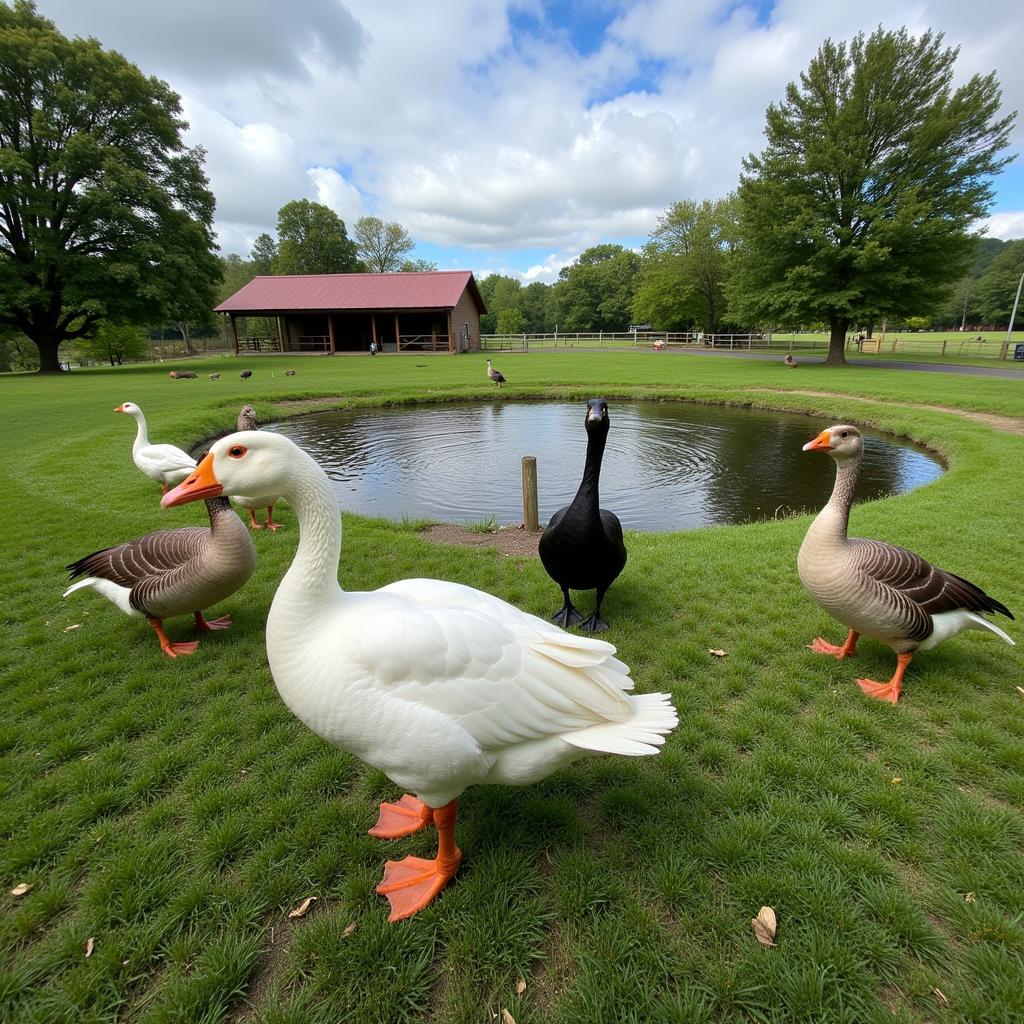African Goose vs Chinese Goose: A Detailed Comparison
African geese and Chinese geese are popular domestic breeds, but what are the key differences between these two waterfowl varieties? This article will explore the distinct characteristics of African geese and Chinese geese, helping you understand their unique traits, temperaments, and suitability for different environments.
Physical Differences: Spotting an African Goose vs. a Chinese Goose
The most noticeable difference between African geese and Chinese geese lies in the presence or absence of a knob on their beak. African geese sport a prominent knob at the base of their bill, while Chinese geese have a more streamlined, knobless profile. This distinctive feature is one of the easiest ways to distinguish between the two breeds. Another key difference is their posture. African geese stand upright, almost vertically, giving them a regal appearance. Chinese geese, in contrast, have a more horizontal posture.
Beyond the knob and posture, there are subtle variations in body size and shape. African geese are typically larger and heavier than their Chinese counterparts. They also tend to have a slightly rounder body shape. Chinese geese are more slender and have a longer neck. While both breeds come in various color variations, including white and brown, the differences in beak, posture, and body conformation make visual identification relatively straightforward.
Temperament and Behavior: Which Breed Suits Your Lifestyle?
While both breeds are known for their alertness and protective nature, there are notable differences in their temperaments. African geese are generally considered more docile and less aggressive than Chinese geese. They are known to be good with children and other pets when raised together. Chinese geese, on the other hand, can be more territorial and assertive, sometimes exhibiting aggressive behavior, especially during breeding season.
This difference in temperament is crucial to consider when choosing a breed. If you have a family with young children or other pets, African geese might be a better fit. However, if you need geese primarily for guarding purposes, the more assertive nature of Chinese geese might be desirable.
Understanding the “Swan Goose” Connection
Interestingly, Chinese geese are sometimes referred to as “Swan geese” due to their elegant, swan-like neck. This can sometimes lead to confusion, as they are not actually related to swans. The term simply refers to their graceful appearance.
Care and Maintenance: Providing the Best Environment
Both African geese and Chinese geese are relatively hardy birds and share similar care requirements. They need ample space to roam and graze, access to clean water for swimming and preening, and a balanced diet of commercial waterfowl feed supplemented with fresh greens. However, due to their larger size, African geese may require slightly more space and food.
 African Goose and Chinese Goose Habitat
African Goose and Chinese Goose Habitat
Housing Considerations for African and Chinese Geese
Providing adequate shelter is essential for both breeds, particularly during inclement weather. A simple barn or shed will suffice, providing protection from rain, wind, and extreme temperatures. Nesting boxes should also be provided during breeding season, allowing the geese a safe and comfortable place to lay their eggs.
Choosing the Right Breed: African Goose or Chinese Goose?
Ultimately, the best breed for you depends on your individual needs and preferences. Consider your available space, your experience with poultry, and whether you prioritize docility or guarding ability.
Dr. Anya Sharma, a veterinarian specializing in avian care, notes, “African geese are excellent for families and beginners due to their calmer demeanor. However, if you require a more assertive bird for security, Chinese geese are a good choice with proper handling and socialization.” Another expert, poultry farmer Mr. Emmanuel Otieno adds, “Both breeds are rewarding to raise, but understanding their distinct characteristics is crucial for ensuring their well-being and your satisfaction.”
In conclusion, both African geese and Chinese geese offer unique qualities. By considering the differences outlined above, you can make an informed decision and choose the breed that best suits your specific requirements. Whether you’re drawn to the stately presence of the African goose or the graceful curves of the Chinese goose, both breeds can be valuable additions to a homestead or farm.
FAQ: Frequently Asked Questions about African and Chinese Geese
-
Are African geese good layers? Yes, both African and Chinese geese are considered good layers, producing a decent number of eggs per year.
-
What is the lifespan of an African goose? African geese can live for 20-30 years with proper care.
-
Are Chinese geese noisy? Chinese geese are known to be quite vocal, especially when alarmed or excited.
-
Do African geese need a pond? While not strictly necessary, a pond or large water source is highly beneficial for their well-being.
-
Can African and Chinese geese live together? Yes, they can coexist peacefully, especially if introduced at a young age.
-
What do African geese eat? They primarily eat grasses, weeds, and commercial waterfowl feed.
-
Are Chinese geese good for meat production? Yes, both breeds are suitable for meat production.
You can find more information on raising geese and other poultry breeds on our website. For assistance, contact us at Phone: +255768904061, Email: kaka.mag@gmail.com or visit us at Mbarali DC Mawindi, Kangaga, Tanzania. We have a 24/7 customer support team.


